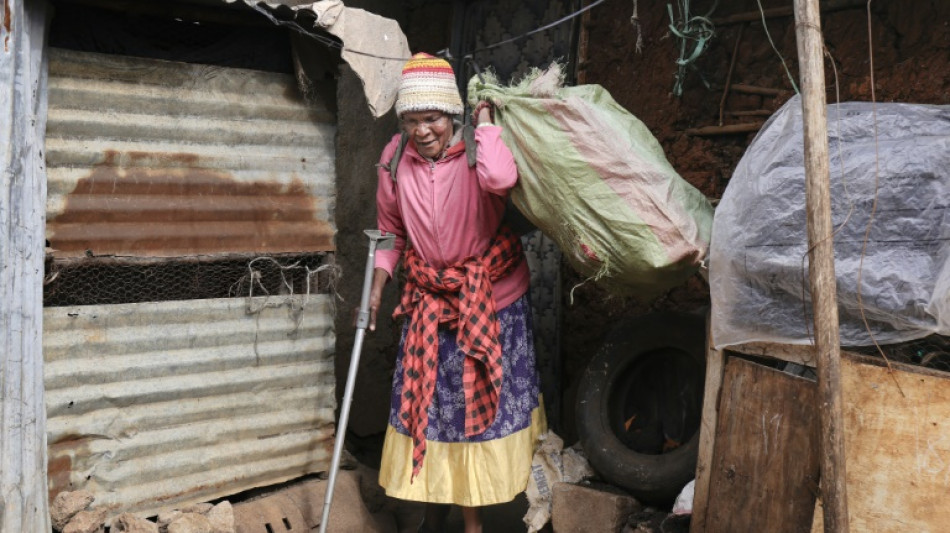
-
 Death toll tops 100 as Philippines digs out after typhoon
Death toll tops 100 as Philippines digs out after typhoon
-
Attack on key city in Sudan's Kordofan region kills 40: UN

-
 'No one could stop it': Sudanese describe mass rapes while fleeing El-Fasher
'No one could stop it': Sudanese describe mass rapes while fleeing El-Fasher
-
Champagne and cheers across New York as Mamdani soars to victory

-
 Medieval tower collapse adds to Italy's workplace toll
Medieval tower collapse adds to Italy's workplace toll
-
BMW boosts profitability despite China, tariff woes

-
 South Africa's Wiese wary of 'hurt' France before re-match
South Africa's Wiese wary of 'hurt' France before re-match
-
Asian markets sink as tech bubble fears grow

-
 Beyond limits: Croatian freediver's breathtaking record
Beyond limits: Croatian freediver's breathtaking record
-
Tottenham supporting Udogie after alleged gun threat in London

-
 Thunder roll Clippers to stay unbeaten as SGA keeps streak alive
Thunder roll Clippers to stay unbeaten as SGA keeps streak alive
-
In appeal, Australian mushroom murderer alleges 'miscarriage of justice'

-
 Toyota hikes profit forecasts 'despite US tariffs'
Toyota hikes profit forecasts 'despite US tariffs'
-
Typhoon death toll soars past 90 in the Philippines

-
 Ex-France lock Willemse challenges Meafou to become 'the bully'
Ex-France lock Willemse challenges Meafou to become 'the bully'
-
Ukrainians to honour sporting dead by building country they 'died for': minister

-
 At least 7 dead after UPS cargo plane crashes near Louisville airport
At least 7 dead after UPS cargo plane crashes near Louisville airport
-
US Supreme Court hears challenge to Trump tariff powers

-
 US government shutdown becomes longest in history
US government shutdown becomes longest in history
-
India's Modi readies bellwether poll in poorest state

-
 Green goals versus growth needs: India's climate scorecard
Green goals versus growth needs: India's climate scorecard
-
Where things stand on China-US trade after Trump and Xi talk

-
 Sri Lanka targets big fish in anti-corruption push
Sri Lanka targets big fish in anti-corruption push
-
NY elects leftist mayor on big election night for Democrats

-
 Injured Jordie Barrett to miss rest of All Blacks tour
Injured Jordie Barrett to miss rest of All Blacks tour
-
Asian markets tumble as tech bubble fears grow

-
 Pay to protect: Brazil pitches new forest fund at COP30
Pay to protect: Brazil pitches new forest fund at COP30
-
Australia pick 'impressive' Weatherald in first Ashes Test squad

-
 Iraq's social media mercenaries dying for Russia
Iraq's social media mercenaries dying for Russia
-
Young leftist Trump foe elected New York mayor

-
 Concerns at ILO over expected appointment of close Trump advisor
Concerns at ILO over expected appointment of close Trump advisor
-
Venus Williams to return to Auckland Classic at the age of 45

-
 No deal yet on EU climate targets as COP30 looms
No deal yet on EU climate targets as COP30 looms
-
Typhoon death toll climbs to 66 in the Philippines

-
 NATO tests war preparedness on eastern flank facing Russia
NATO tests war preparedness on eastern flank facing Russia
-
Uncapped opener Weatherald in Australia squad for first Ashes Test

-
 Liverpool down Real Madrid in Champions League, Bayern edge PSG
Liverpool down Real Madrid in Champions League, Bayern edge PSG
-
Van Dijk tells Liverpool to keep calm and follow Arsenal's lead

-
 PSG left to sweat on injuries to Dembele and Hakimi
PSG left to sweat on injuries to Dembele and Hakimi
-
Reddit, Kick to be included in Australia's social media ban

-
 Ex-Zimbabwe cricket captain Williams treated for 'drug addiction'
Ex-Zimbabwe cricket captain Williams treated for 'drug addiction'
-
Padres ace Darvish to miss 2026 MLB season after surgery

-
 Diaz hero and villain as Bayern beat PSG in Champions League showdown
Diaz hero and villain as Bayern beat PSG in Champions League showdown
-
Liverpool master Real Madrid on Alexander-Arnold's return

-
 Van de Ven back in favour as stunning strike fuels Spurs rout
Van de Ven back in favour as stunning strike fuels Spurs rout
-
Juve held by Sporting Lisbon in stalling Champions League campaign

-
 New lawsuit alleges Spotify allows streaming fraud
New lawsuit alleges Spotify allows streaming fraud
-
Stocks mostly drop as tech rally fades

-
 LIV Golf switching to 72-hole format in 2026: official
LIV Golf switching to 72-hole format in 2026: official
-
'At home' Djokovic makes winning return in Athens


'Restoring dignity': Kenya slum exchange offers water for plastic
Using a crutch to bear her weight, 85-year-old Molly Aluoch trudges from her mud-walled room on the outskirts of a sprawling Nairobi slum, shouldering a sack of used plastic to exchange for a shower or a safe toilet.
For the 31 years she has lived in Kibera, Kenya's largest informal settlement, water and sanitation have remained scarce and costly -- often controlled by cartels who charge residents prices beyond their means.
The Human Needs Project (HNP) seeks to mitigate that. Residents can trade discarded plastic for "green points", or credits, they can redeem for services such as drinking water, toilets, showers, laundries and even meals.
"With my green points, I can now access a comfortable and clean toilet and bathroom any time of the day," Aluoch said.
Before, she would spend 10 shillings (eight US cents) to use a toilet and another 10 for a bathroom, a significant chunk from the residents' average daily income, 200 to 400 shillings, before food and housing costs.
"It meant that without money, I would not use a toilet," she said.
Unable to use Kibera's pit latrines owing to her frailty meant she would have to resort to "unhygienic means".
Now, that money goes towards food for her three grandchildren.
Aluoch, a traditional birth attendant, is among some 100 women who collect plastics for green points, helping them access water, sanitation, and hygiene services.
She takes her plastic to a centre 200 metres (yards) from her home, where one kilogramme of recyclable plastics earns 15 green points, equivalent to 15 shillings.
The project serves some 800 residents daily, allowing them access to modern bathrooms, clean water and menstrual hygiene facilities -- services that are out of reach for many Kibera households.
Since 2015, the project has distributed more than 50 million litres (13 million gallons) of water and more than one million toilet and shower uses.
In 2024 alone, it distributed 11 million litres of water and enabled 124,000 bathroom and toilet uses.
- 'Days without water' -
With water a scarce commodity in Kibera, it is common for vendors to create artificial shortages to inflate prices, forcing residents to pay more than 10 times the normal price.
The city's water service charges between $0.60 and $0.70 per cubic metre for connected households, but by comparison, Kibera residents have to stump up as much as $8 to $19 for the same amount.
"Getting water was hard. We could go several days without water," said Magret John, 50, a mother of three.
Today, her reality is different.
"The water point is at my doorstep. The supply is steady and the water is clean. All I need is to collect plastics, get points, redeem and get water," she said.
John, who has lived in Kibera for nine years, says the project has been a game changer, especially for women and girls.
"Access to proper sanitation services guarantees women and girls their dignity during menstruation."
Now, with 10 water points spread across Kibera -- pulled from a borehole with a daily capacity of half a million litres -- NHP shields some residents from informal vendors' exploitative pricing.
The project's dual mission is to meet basic human needs while tackling Kibera's mounting waste problem.
HNP's director of strategic partnerships Peter Muthaura said it helps to improve health and the daily living conditions in Kibera.
"When people cannot access dignified toilets and bathrooms, the environment bears the impact," he said.
It also fosters development, he said.
In the first quarter of 2025 alone, Kibera residents delivered two tonnes of recyclable plastic, with around 250 women directly engaged in daily collection and delivery.
For Aluoch, every sack of plastics and every green point earned goes beyond clean water and sanitation: it restores a sense of dignity.
"My prayer is that this project spreads to every corner of Kibera, and reaches thousands of women whose dignity has been robbed by a lack of sanitation services," she said.
O.Salim--SF-PST

